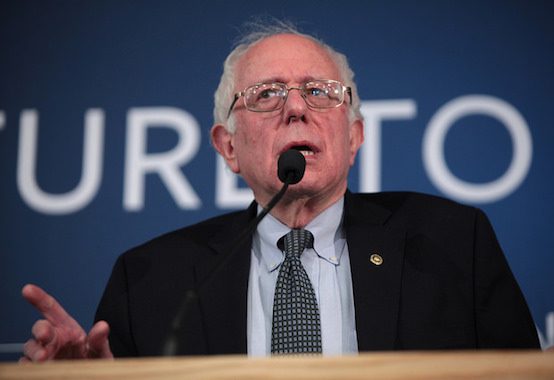Sanders’ Commitment to Peace and Diplomacy

There was a silly story in The New York Times last week that tried to portray Bernie Sanders’ sister-city relationship with Yaroslavl as an opening for Soviet propaganda. In fact, as President Reagan’s former U.S. ambassador to the USSR, Jack Matlock, explained in a letter to the editor a few days ago, this program was a successful example of constructive American diplomacy encouraged by the U.S. government:
“Papers Detail Soviet Hopes for Sanders” (front page, March 6) is a distortion of history. The truth is that Bernie Sanders, then the mayor of Burlington, Vt., opened a sister-city relationship with Yaroslavl in 1988 with the encouragement and strong support of the United States government.
The visit was not used as propaganda by the Soviet Union. I know because I was U.S. ambassador to the U.S.S.R. at the time and gave strong official support to Mayor Sanders’s effort, along with those of other American mayors, to establish ties with cities in the Soviet Union [bold mine-DL].
Expanding people-to-people ties was one of the important goals of President Ronald Reagan’s policy toward the U.S.S.R., a policy that was continued by President George H.W. Bush.
The explanation the Soviets gave to local Communist officials in Yaroslavl — that sister-city relationships are useful for “carrying out information-propaganda efforts” — was actually an effort to justify Mikhail Gorbachev’s new openness to people who had no contacts with Americans and were trained to see all Americans as spies.
In fact, the contacts played an important role in opening up Soviet society and facilitating Mr. Gorbachev’s reforms.
Sanders went to the USSR during the era of glasnost (lit., openness), and he built a relationship with a Soviet sister city in the name of promoting greater understanding and cooperation. This was not only an admirable goal, but it also happened to be the stated goal of both the U.S. and Soviet governments at that time. There was nothing wrong with what he did, and as Ambassador Matlock explains he helped to advance U.S. policy goals. The fact that he was willing to participate in this program and engage with people from the other side of the divide in the Cold War is to his enormous credit. The original NYT article quotes Sanders as writing this:
“I believe that sister city programs like the Yaroslavl Burlington one, will help improve Soviet American relations and develop a more peaceful world,” Mr. Sanders wrote.
That is a laudable sentiment, and one that was widely shared at the time that he wrote it. Sanders was right about this. It is a measure of how warped our foreign policy debates are that a worthwhile diplomatic initiative from over thirty years ago is being spun as something else now that Sanders happens to be running for president. It is no wonder that our foreign policy is so heavily biased in favor of confrontation and belligerence when the most harmless diplomatic contacts from decades ago are still portrayed in a somewhat sinister light. Matlock’s point bears emphasizing: the explanation delivered to local Soviet officials was “an effort to justify Mikhail Gorbachev’s new openness to people who had no contacts with Americans.” In other words, it was an attempt to circumvent Soviet hard-liners by making them think that it was a propaganda campaign when it wasn’t. Now Sanders is being attacked because of a political fiction that Gorbachev’s people invented to make it easier for the U.S. and the Soviet Union to cooperate. It is a given that the NYT doesn’t like Sanders and doesn’t want him to be the Democratic nominee, but the framing of that article is absurd.
It is curious how critics of Sanders’ foreign policy record feel that they have to go back thirty years or more to find something that they think will be damning, but each time that they dig something up they just remind the rest of us that Sanders has been upholding the same sound principles. He has espoused a commitment to peace and diplomacy from the time that he was a mayor, and he has held fast to that commitment since then. Should Sanders be embarrassed that he took part in an effort to improve ties between the U.S. and the USSR as the Cold War was winding down? Should he apologize for trying to promote peace between these countries? I don’t think so. The truth is that U.S. foreign policy would be better if we had more officials at all levels that embraced engagement with their counterparts in other countries.
It is regrettable that there is nothing comparable to this program today to bridge the chasms that have opened up between the U.S. and other nations over the decades. The lack of regular people-to-people contacts between the U.S. and Iran greatly hampers both our government’s understanding of Iran and prevents the sort of diplomatic breakthroughs that occurred near the end of the Cold War. We would benefit from having more officials that want to build relationships with other countries instead of constantly promoting those that thrive on conflict.
Comments